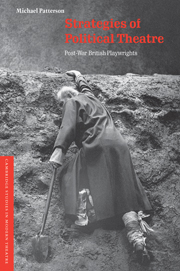Book contents
- Frontmatter
- Contents
- Acknowledgments
- Brief chronology, 1953–1989
- Introduction
- Part 1 Theory
- Part 2 Two model strategies
- Part 3 The reflectionist strain
- Part 4 The interventionist strain
- 7 Agit-prop revisited: John McGrath's The Cheviot, the Stag and the Black, Black Oil (1973)
- 8 Brecht revisited: David Hare's Fanshen (1975)
- 9 Rewriting Shakespeare: Edward Bond's Lear (1971)
- 10 The strategy of play: Caryl Churchill's Cloud Nine (1979)
- Conclusion
- Notes
- Select bibliography
- Index
7 - Agit-prop revisited: John McGrath's The Cheviot, the Stag and the Black, Black Oil (1973)
Published online by Cambridge University Press: 22 September 2009
- Frontmatter
- Contents
- Acknowledgments
- Brief chronology, 1953–1989
- Introduction
- Part 1 Theory
- Part 2 Two model strategies
- Part 3 The reflectionist strain
- Part 4 The interventionist strain
- 7 Agit-prop revisited: John McGrath's The Cheviot, the Stag and the Black, Black Oil (1973)
- 8 Brecht revisited: David Hare's Fanshen (1975)
- 9 Rewriting Shakespeare: Edward Bond's Lear (1971)
- 10 The strategy of play: Caryl Churchill's Cloud Nine (1979)
- Conclusion
- Notes
- Select bibliography
- Index
Summary
To tell the truth is revolutionary.
Political theatre can take many forms, and, as the Introduction makes clear, the focus of this volume is on political playwrights and not on the many groups who have made political theatre from devised and documentary material. There is one group, however, whose work, uniquely, has been consistently linked with the work of a major playwright. The group is 7:84, and the playwright John McGrath. Their varied output will be considered primarily in one example, a supremely interventionist piece of theatre, The Cheviot, the Stag and the Black, Black Oil.
The 7:84 Theatre Company was founded in 1971 by McGrath and like-minded theatre-workers, including his wife Elizabeth MacLennan. It was named after the disturbing statistic, revealed by The Economist in 1966, that a mere 7 per cent of the population of Britain owns 84 per cent of its capital wealth. The founding of the company was based on the recognition that ‘there has to be a struggle, there has to be a political organisation, there has to be a very hard, bitter, disciplined fight against the powerful forces of capitalism’.
Unlike Edgar, Hare and Brenton, who began with small-scale touring and then went on to write for major playhouses, McGrath started as a well-paid provider of scripts for theatres, television and the cinema, and then turned towards more modest venues.
- Type
- Chapter
- Information
- Strategies of Political TheatrePost-War British Playwrights, pp. 109 - 124Publisher: Cambridge University PressPrint publication year: 2003



